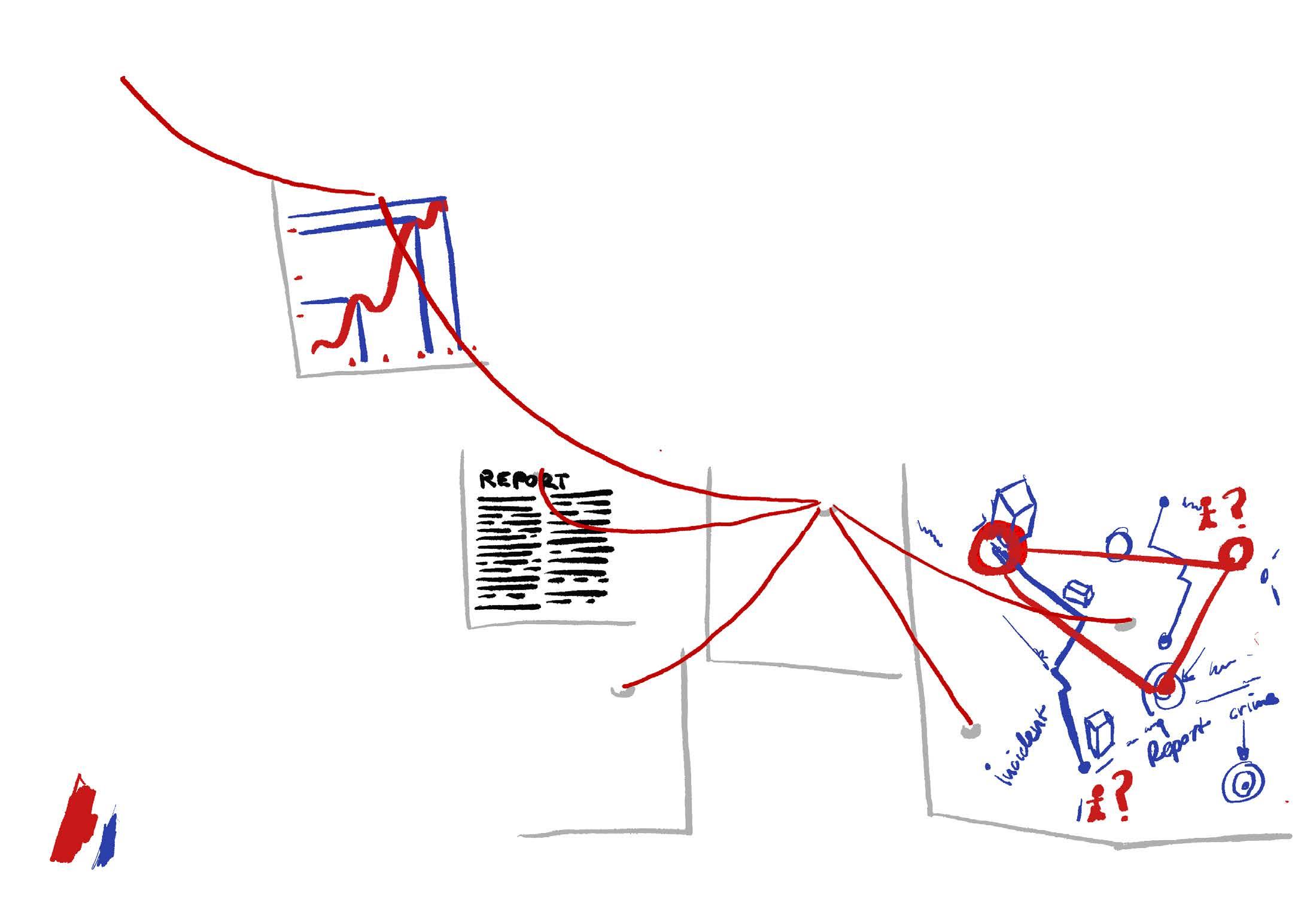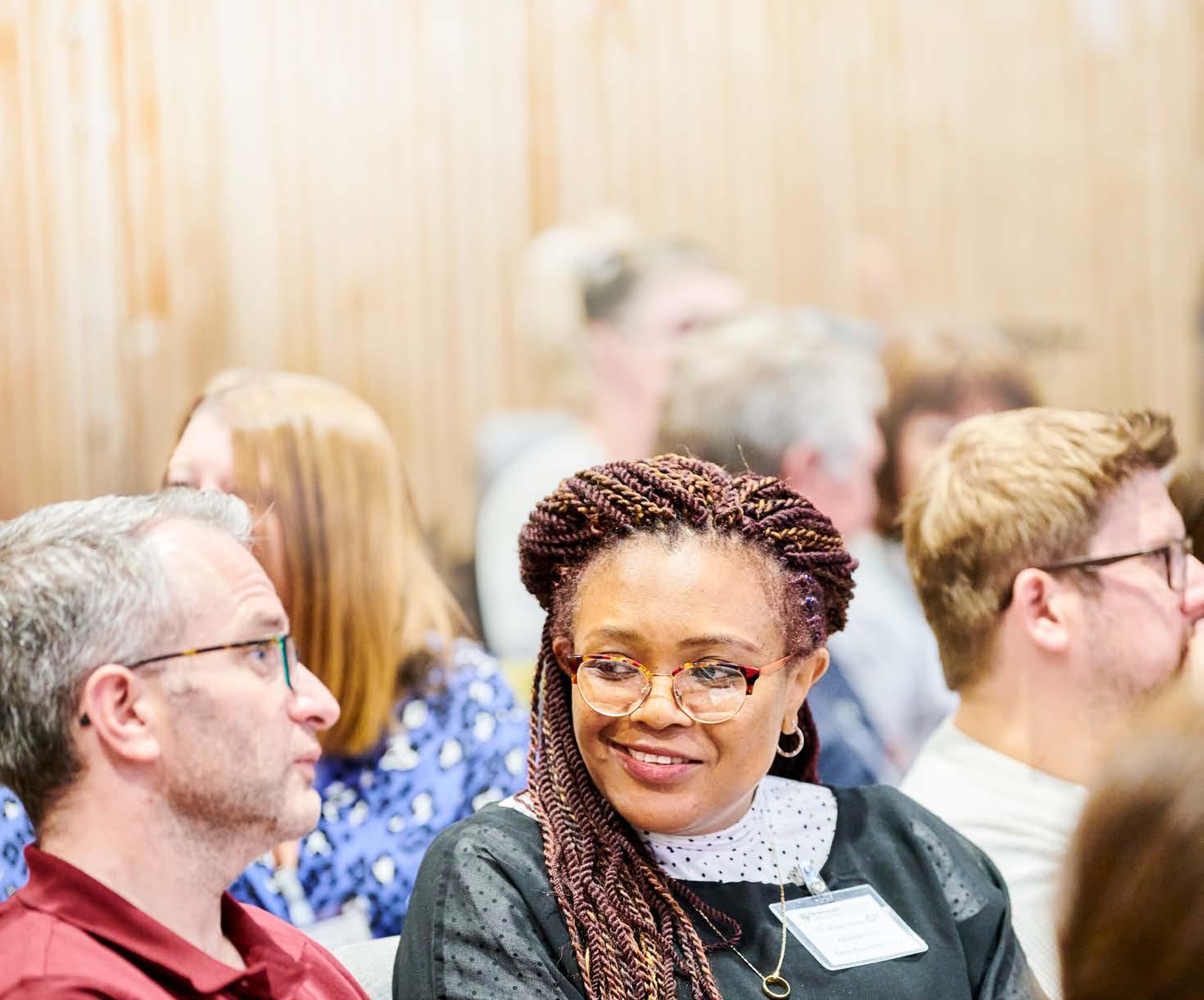




I am proud to hold the post of Associate Dean Research at Newcastle University Business School and be part of a community of worldleading academic researchers who have the skills of applying their knowledge to real-world scenarios, in addition to supporting the work of business and employees at a local and global level.
The quality and breadth of research undertaken in the School is evident in the stories being told in this edition of Reach. The articles demonstrate how our researchers are able to approach issues with integrity, compassion and creative thinking.
Professor Abigail Marks Associate Dean Research Newcastle University Business SchoolOne of the highlights of this edition includes showcasing our work in the creative industries, focusing not only on the structure of the sector itself but also on the experiences of those working within creative organisations. Our experts also examine the challenges of securing paid work within the creative sector and concerns about how ‘hope labour’ can lead to potential exploitation of workers. Other challenges for workers highlighted in this edition focus on those individuals with caring responsibilities. All the issues showcased in this edition are of relevance for individuals and organisations globally.


“The quality and breadth of research undertaken in the School is evident in the stories being told in this edition of Reach.”
In this issue

6. Working abroad: Creating more opportunities for female workers

10. A new hope for the creative industries? How hopes and desires can open up creative workers to exploitation
18.
Technology: Is it affecting our ability to be responsible, active citizens?
Cover story
22.
Shining a light on the creative industries: From the North East to the world






12. Understanding the geography of crime

16. Preparing small enterprises for future crises
24.
Highlighting the value of stability in supply chains

28. Spotlight on: Our PhD students

Featured article
Working abroad can be an excellent way for employees at multinational companies to advance their careers. But why are so many of these roles still filled by men? Our ongoing research suggests that businesses still have a way to go in creating structures that truly empower women.
The Author
Dr Benjamin Bader Senior Lecturer in International Human Resource Management Newcastle University Business SchoolView profile


When it comes to selecting promising leadership candidates, many companies place a high value on international work experience.
If a candidate has an overseas assignment on their CV, it is often seen as a sign that they are able to rise to challenges, adapt to different cultures and embrace fresh perspectives.
Frustratingly, women are still under-represented in these roles. According to a 2023 survey by Mercer, just 20% of the total number of employees working abroad for multinational companies are women.
So how should multinationals address this problem? Many have opted to try and disregard or hide the gender of applicants during the decision-making process, an approach known as gender-blind selection.
However, our recent study suggests that this approach has a limited effect, as biases toward men linger in the thinking and organisational practices of companies – as well as in the people that make decisions.
The study states that it is time for organisations to “make the changes that are necessary to truly provide equal opportunities for everyone, rather than making attempts to have female employees change their behaviours, needs, or requirements to become a better fit within the current systems”.
Shining light on an underexplored field
The 2023 study was authored by Dr Benjamin Bader, alongside Jana Bucher of the Institute for Human Resource Management in Bremen, Germany, and Almasa Sarabi of the University of Amsterdam.
The researchers interviewed senior global mobility managers at multinational companies in Europe and North America, to investigate how organisational policies might contribute to this issue. The study then used this information to suggest initiatives and practices that could address the situation and support greater gender equality.
Dr Bader has spent many years researching international human resource management, leadership and the future of work. He is a strong believer in the character-building benefits of overseas work and travel, having spent time in countries such as Denmark, the United States and Canada.
He argues that the relationship between gender and global mobility is an underresearched field that needs more attention, particularly since overseas work can have such an impact on career advancement.
He says: “In many organisations, overseas experience is almost a prerequisite for senior leadership positions. You need to be good at your job, have leadership experience, and also have international experience to rise to the top.”
Do gender-blind practices actually help?
For several years, companies have been attempting to find solutions to a problem dubbed “the broken rung”.
Women make up nearly 50% of those enrolled in top business schools, but their careers tend to stall compared to their male counterparts. This results in a progressively smaller pool of female talent, and a pronounced imbalance at executive levels.
Given the link between overseas working and promotion to leadership roles, the authors of the 2023 study set out to discover if any specific measures were being put in place to target and encourage more women into these posts.
They discovered that many multinationals do not specifically target female overseas workers in their gender diversity management policies. Instead, they offer the same support and allowances to all employees, regardless of gender. One interviewee stated that all policies were “designed on the basis of the type of assignment, rather than who is actually transferring”.
Dr Bader argues this is a problem, as many of the structures, procedures and working cultures have traditionally been designed with men in mind. Furthermore, many decision-makers also retain traditional preconceptions about whether women are interested in these roles, and how effectively they perform in them.
“Many programmes are still tailored to support married middle-aged white men with children and a non-working wife,” says Dr Bader.
“The idea is that you relocate, you find a school for your children, and the company gives your wife some money to stay home. Anything that deviates from that is the expat’s problem to solve.”
Many mobility managers interviewed as part of the research admitted that companies could do more to design assignments that recognise the needs of female candidates. One said multinationals should have “a much better plan for why we send them and what happens after they return”. This could include targeting women at different stages of their careers, or considering more tailored support structures.
The managers also observed that female employees are often not made aware of overseas assignments that may be available to them. Even if selected, women find there are often few female-specific networks, which means that guidance and recommendations around overseas assignments normally come from male-dominated groups.
Interviewees believed that setting up female-specific mentoring programmes and networks would be beneficial, as well as launching campaigns targeted specifically at women. They also called for a greater focus on policies which specifically address issues such as supporting dual-career couples, rather than seeing the “trailing spouse” as the norm.
In conclusion, the authors observed that –even though companies may feel they are adopting universal and fair practices –“gender-blind global mobility approaches and stereotypes about female expatriates fuel each other, ultimately intensifying the challenges for female expatriates”.
So how can companies address these issues?
In the study, the authors offer a series of suggestions for those looking to raise awareness and opportunities for women in overseas assignments.
These include:
• introducing awareness campaigns specifically targeted at women, sharing the benefits of overseas work and communicating opportunities to all employees regardless of gender
• creating mentorship and buddy programmes for female expats
• developing more individualised support for candidates looking to work abroad
• creating work opportunities for male spouses, as well as flexible working and parental leave opportunities
They also suggested offering virtual or shorter assignments for those who do not feel able to work abroad for a long spell.
Dr Bader believes this research can encourage companies to revisit and hopefully change their support structures, and implement approaches that specifically target and empower women.
This would increase the number of opportunities available for women and help address workplace inequality. However, he says this also has the potential to benefit organisations as a whole, bringing in a greater diversity of skills and perspectives and ultimately making them more adaptable, resilient and successful.
He says: “The question companies should be asking themselves is: ‘Are our systems good enough to support women?’
“This is one key reason why companies have problems filling leadership roles with women, and it’s something that’s been going on for a while.
“If we don’t change the fundamental requirements of the system, we’re still going to be talking about this in 50 to 100 years.
“Our research shows that there’s this sense that it’s the woman who needs to adjust, but that’s not going to work. You need to fix the system which is still designed to favour men for such positions.”
Dr Bader says that – if companies are serious about attracting more women to these roles – they should consider a more personalised approach that reflects their needs. This could even include establishing quotas where necessary.
“If companies want to address this imbalance, they need to provide more attention to women’s career progression.
“We need people to point out the flaws and not hide behind gender-neutral systems. Question how things work. Speak to the people involved, and not just the people who go on these assignments.
“This is an issue that needs to be constantly on the agenda and in conversations.” ■
“It is time for organisations to make the changes that are necessary to truly provide equal opportunities for everyone, rather than making attempts to have female employees change their behaviours, needs, or requirements.”

Comment piece
In the creative industries, it is commonplace that people work for little or no money, often for experience or exposure, in the hope that future work or creative opportunities may follow. We call this phenomenon ‘hope labour’, and it is widespread, especially among those in the early stages of their career.
Work in the creative industries typically involves self-employment, project-work, long hours and competition for scarce opportunities. Creative work is typically unregulated, flexible and precarious. Work is mediated through a confusing mixture of opportunity and uncertainty. At the same time, hope manifests in the possibility of artistic freedom and community and social responsibility.
Creative workers are characteristically specialists in self-organisation and enthusiasm beyond the bounds of standardised employment. In this sense, they often assume many of the risks and costs associated with their livelihoods, exemplifying and embodying an individualised and deregulated relationship with work.
Hope labour emerges when work is discounted against future creative possibilities, projects, or earnings. As a form of self-exploitation, it can provide experiences that are meaningful and valuable, yet this occurs against an economic background of deteriorating funding, support, working conditions and pay.
The Author Dr Ewan Mackenzie Lecturer in Work and Employment Newcastle University Business SchoolView profile


In my recent research, co-authored with Professor Alan McKinlay, Professor of Human Resource Management, we interviewed a range of creative workers about working at reduced rates or for free. Our study found that hope labour has the effect of sustaining and exacerbating inequalities. Hope labourers can be eager to get a foothold in their chosen field, so much so that they can leave themselves open to exploitation. Moreover, the impact that hope labour has on labour markets is destructive. By working for free or at low rates, hope labourers reduce the value of labour in the very sectors they wish to work in. They effectively become the gravediggers of their own and their peers’ careers.
In creative work, working for free is often understood as a rite of passage, or as a necessary pre-condition to paid work. One respondent in our research stated that, “The artist has to prove that they deserve to earn their living”. Free labour also becomes worthwhile for the individual because it can provide learning experiences that can provide skills for the future. For example, another respondent noted that, “I’m not very good at telling myself that this thing I’ve spent all night figuring out is for the client, and I should be paid for it. I think ‘well, I’ll use that in the future, therefore it’s my own professional value… therefore I shouldn’t get paid for it’”.
Unfavourable labour conditions become the responsibility of the hope labourer. Critiques of wider economic conditions are reframed in terms of one’s own learning and abilities. Hope labour provides the means of ‘investing’ in a professional self that will be amortised in the future.
For creative workers who are seeking to establish themselves, the lure of work that promises exposure, and in turn better paid work, can justify lengthy spells of poorly paid work. Choosing to undertake free or underpaid work is often described as a calculated decision taken in the hope of increased self-determination in the future. As one aspiring app developer noted, “we want to do some freelance projects and that will get us some exposure, and we can maybe get more people interested from there. But obviously, the amount of hours that we are going to put into that app, it’s going to be, well, it may be even months, you know, about £2 an hour or something”.
This illustrates how cultural workers often exchange unpaid and under-compensated work for self-determination and autonomy. Through these experiences hope labourers downplay structural equalities and open themselves up to a form of self-exploitation. Hope labour is significant because it shifts the costs and risks of employment onto the labourer. Being passionate about creativity and art can downplay the severity of unequal power relations: a form of ‘cruel optimism’ that comes with the promise of turning experiences of insecurity into future deferred security. Hope labour is also only available to those who can afford the time and resources to make such investments. Its pervasiveness also weakens the value of labour in the sectors that hope labourers wish to work.
How might precarious work in the creative industries be challenged? Many creative workers are aware that opportunities are slim, and that they are often, begrudgingly, in competition with each other. As one freelance artist and curator commented during the research, “Artists are really bad at saying how much they’re worth, so if there’s anything [that] could help, it’s like a bit of handholding and solidarity, because they’ll undercut each other all the time, because we’re all so broke”.
Our research clearly highlights the pitfalls of hope labour for creative work collectively, despite its meaningfulness and importance for the individual. Nevertheless, desires and hopes can be directed towards critiquing and changing the way in which creative work is governed and managed. Unionisation is important and can help, yet minimum pay rates can cause unease with creative workers concerned that they may be missing out on opportunities.
At the same time, employers and larger cultural organisations have a responsibility to ensure that creative workers are paid fairly for their work. The future of cultural work does, however, as one of our participants noted, depend on solidarity among its workers for its economic survival. ‘Hope’, in this sense, is more cooperative and collective in its desire for a more flourishing future. ■
Featured article
What can we learn about crime from precisestreet level data? One Newcastle University




When we talk about crime, we often associate it with place.
Perhaps we casually describe a part of our city as a “high-crime area”, or warn friends not to leave their car in certain neighbourhoods. But where do we get these conclusions from? General statistics, maybe? Newspaper reports? A personal experience, possibly, or even a second-hand one?
When Professor Nils Braakmann hears or reads a story like this, he’s frequently inspired to test it. Professor Braakmann is a Professor of Economics at Newcastle University Business School, who uses large datasets to investigate questions around crime, health and other topics.
He says: “I’m very much a data-first person. You can come up with theories on all sorts
When Professor Braakmann first saw the dataset, he was a little surprised that there weren’t more people using it.
“Normally, when you get hold of data that no one else is using, it’s because you’ve got some form of special access.”
The dataset in question is located at police.uk This is an open data site which features crime, outcome, and police activity data such as arrests and call-handling. You can download it, or explore an API. Intriguingly, the data is often precisely geocoded, down to the exact street.
Open data is data that is designed to be accessed, used and shared by anyone. Many government bodies, local authorities


“You use data that you haven’t analysed in a certain way before, and suddenly you find other questions you haven’t answered yet.”
Many of Professor Braakmann’s trials are prompted by curiosity.
For example, after a colleague got burgled, they were told by police that the offenders were likely looking for gold.
This conversation sparked Professor Braakmann’s joint paper with Arnaud Chevalier of Royal Holloway and Tanya Wilson of the University of Glasgow, investigating whether factors such as changes in the price of gold affected the location and frequency of property crime.
The study analysed crime data in England and Wales between 2011 and 2019, and found that a 1% rise in the price of gold increases burglaries in South Asian neighbourhoods by 0.057% relative to other neighbourhoods. This was reportedly due to the expectation that South Asian families would keep gold jewellery at home, and wear it for religious and social festivities.
The data has also proved useful in analysing the impact of policing techniques. After a high-profile murder in Newcastle city centre in 2019, Professor Braakmann investigated the impact of the subsequent stop-andsearch campaign on different types of localised crime.
He noted that stop-and-search in the city centre doubled on average in the months following the murder, and at one point was as high as three times the normal amount. But he found little evidence of impact on drug offences, weapon offences or violent crime in that period.
The study concluded that any reduction in crime over the period was more likely influenced by the presence of more police on the streets, rather than stop-and-search itself.
Professor Braakmann has also investigated the relationship between deaths related to police use of force and crime reporting rates in individual neighbourhoods.


After one particular incident – the shooting of Chris Kaba in September 2022 – he noted a sharp drop in reported crime in black neighbourhoods in London, as well as a drop in the proportion of crime without a suspect.
He says this is consistent with the idea of a drop in trust in the police, and a reluctance to interact with them to report certain types of crime that are unlikely to be solved.
Professor Braakmann’s interests are not just focused on policing, however.
His recently submitted paper, co-authored with former Newcastle University undergraduate Wednesday Croft, examined the impact that extra security measures at a particular Tesco supermarket had on shoplifting and local crime rates.
After an increase in UK inflation resulted in a rise in shoplifting in 2022, Tesco’s then-chair John Allan CBE announced the supermarket giant was bringing in added security in its stores, as well as tagging a wider variety of mid-range and expensive goods.
Professor Braakmann says: “There’s not really a lot of literature about the impact of private security measures, such as video doorbells, CCTV and burglar alarms. So we found a nationwide list of supermarkets and tested it out on locations in London.”
By cross-referencing a list of Tesco outlets and other major supermarkets with a streetlevel map of geocoded crime data, the study found declines in shoplifting equal to around 16% of the mean between September 2022 and January 2023. Tesco was the only major supermarket chain to see this drop.
They also investigated whether any of these incidents had been displaced to other locations as a result of Tesco’s measures, and found little evidence of this in other major supermarkets. However, there was a slight increase in shoplifting on streets without major supermarkets, equal to around a third of the decreases seen by Tesco.

He argues that an important part of testing assumptions is to explore and compare different data or phenomena, and find links that may not have been immediately apparent beforehand.
He says: “You use data that you haven’t analysed in a certain way before, and suddenly you find other questions you haven’t answered yet.
“There’s a lot more data out there these days on all sorts of things, and we now have a much better understanding of how we can use it to look at causal relationships. We’ve got the toolkit to answer a lot of very important policy questions in a data-driven way, which is a lot better than everyone just doing what they think might work.” ■
In conversation
Dr Paul Richter, Senior Lecturer in Innovation and Entrepreneurship, sits down with us to discuss his research into small enterprises, with a focus on how regulations, although burdensome in certain respects, can have a positive impact on small businesses and how they operate.
What is your area of research expertise?
I’ve carried out research in lots of different areas over the years, but more recently my focus has been entrepreneurship and small businesses. I’ve been working on projects with colleagues looking at how universities can best support business owners as they try to develop and grow. I’ve also looked at how cultural and creative businesses relate to entrepreneurship.
What are you currently exploring?
A recent project I’ve led on called SECT:OR looks at small and micro businesses in the UK, and how they experienced the various regulations that came along in response to the Covid-19 pandemic.

Findings from this work suggests that regulations didn’t necessarily have a negative impact on small businesses. Can you tell us more about this?
Many commentators tend to assume that having more regulations is a bad thing for small businesses and what they need is less regulation so they can get on with the stuff that matters to them – such as innovating, growing and making money.
The research that we’ve just finished, along with other projects I’ve worked on in this area, have found that sometimes regulation is welcomed by businesses.
The Author Dr Paul Richter Senior Lecturer in Innovation and EntrepreneurshipNewcastle University Business School
View profile
This work builds on a previous project I was involved with, which took an in-depth look at the relationship between small businesses and regulation and how they manage and understand it. These projects bring home how diverse the small business community is and therefore how regulations need to take account of a diversity of experience.
It can be a good thing as it can lead to the creation of new markets and differentiate a business from its competitors. Regulation often becomes a routine part of doing business and not a terrible thing that all businesses need to escape from.
We must remember that during the pandemic businesses were faced with an onslaught of regulation, such as shutting down premises and sending workers home – these were major changes to the way that they could operate.

We found when we surveyed and interviewed small businesses, there were some positive things that came from having to comply with these regulations. Some businesses found their new way of working revelatory. So, one thing our work does is raise awareness of some of the benefits of the regulatory shock that businesses experienced as well as documenting how difficult many found adjusting to the changing regulatory environment.
You mention that not one size fits all as small businesses within the UK are so diverse. Can you help us understand a bit more about what you mean?
In the UK’s population of micro and small businesses, there’s incredible diversity with how they operate. This also applies to regulation in terms of what they must comply with and the resources they have to do so.
The impact of a pandemic like Covid-19 showed how some businesses had to deal with a lot more regulatory changes than others; for example, a self-employed person working from home versus a business with 25 staff.
And the shock of new regulation was felt more keenly by some businesses compared with others, depending on how tough it already was to comply with regulations that existed prior to the pandemic, like GDPR or anti-money laundering regulations. Those businesses put the extra burden of Covid-19 regulations into perspective.
We also found through the survey that the methods of how small businesses found out about what needed to be done and how it affected their business specifically varied across the business community.
This ranged from following government announcements, seeking out guidance from trade bodies such as Federation of Small Businesses, and using social media. With the latter, some business owners told us they would chat with each other about the regulations and how to respond.
Knowledge about how businesses come to understand regulations is very limited, but we think it is really important in shaping policies around how to achieve better compliance.
Going forward, what changes can the government make to ensure they consider and support small businesses in terms of regulation for any future crises?
One obvious point is about clarity. In the SECT:OR project, we asked businesses how clear was the distinction between regulations enforceable by law and non-mandatory government guidance.
A lot of businesses didn’t know the difference between things they must do and nonmandatory actions to respond to pandemic regulations. It was different kinds of intermediaries, for example, trade bodies, that spoke their language and helped businesses to understand what they needed to do. Making more use of these bodies to communicate information to their relevant sector in the future would be positive.
We also suggested that it would be useful in the future if there was greater use of illustrations of compliance in communications with businesses, to help them understand ‘good’ responses to regulations. We encourage regulators and policymakers to consider such compliance illustrations to help businesses be good compliers.
Grace periods would also be a great addition, to give different businesses time to adjust and make the appropriate changes to their business to comply. This would be particularly helpful for smaller businesses as they tend to have less ability to respond quickly. ■
Featured article
We use technology every day to make our lives more efficient, productive and convenient. But is there a trade-off? Our research suggests that over-reliance on technology can affect our ability to think and act independently, and to participate effectively in society.
The Author Dr Cristina Neesham Associate Dean Ethics, Responsibility and Sustainability (ERS)Newcastle
University Business SchoolView profile


If you want to master a skill, the advice is usually simple – train regularly, keep practising, and remember: if you don’t use it, you lose it.
The same applies to our brains. As citizens, we are expected to engage critically with public debate, and form rational conclusions based on our analysis of evidence and arguments.
However, this requires work. If we delegate that responsibility too much – whether that’s to a system, a government or a technology – we may find ourselves less able to do so when it really matters.
This is a phenomenon known as “Organised Immaturity”. Organised Immaturity is a major focus of the work of Dr Cristina Neesham, working alongside project leader Professor Andreas Georg Scherer of the University of Zurich, Professor Dennis Schoeneborn of Copenhagen Business School and Professor Markus Scholz of the Technical University Dresden.
Organised Immaturity is not caused by any single factor or entity, and is induced by the combination of various social mechanisms. However, Dr Neesham argues that relying too heavily on technology in our daily lives can play a noticeable role in the deterioration of our maturity as citizens.
She says: “What we are seeing with the widespread introduction of digital technologies is an erosion and loss of maturity.
“This has an impact on an individual’s capacity to govern themselves and to participate fully in society. And the most dangerous thing about it is that it’s embraced voluntarily. We’re all tempted – for the sake of little comforts and conveniences – to let go of much more serious and important values such as privacy, autonomy and self-reliance.”
Dr Neesham’s research investigates how Organised Immaturity can take hold in societies, and how it affects us. It also suggests several ways to counteract its effects at a governmental, grassroots and individual level, as long as people are willing to act.
Over-reliance on technology can manifest itself in many different ways.
Perhaps we might find ourselves checking our weather app, rather than simply looking out of the window. We may allow ourselves to be guided by algorithm-driven suggestions that determine what we put in our shopping carts, or even influence the decisions we make in work and politics. Indeed, previous research has suggested that we already outsource the task of remembering certain facts and personal information to search engines.
This phenomenon concerns not only the consumer decisions we make in our private lives, but also the political choices that affect our collective futures.
Dr Neesham describes her work on this topic as “big theory”. Essentially, her role is to identify an overarching theory that explains the challenges we are facing, so that others can investigate and build solutions that work for different communities and use cases.
A paper published by the team in 2023 observed that the social trends we are discussing today share striking similarities with conversations dating back as far as the European Enlightenment.
The paper analysed and evaluated how different societal evolutions in modern history affected behaviour, and noted similar discussions about independent thinking and engagement in democratic processes.
“We live in a new age of information. Now we need to think about how we live in this society, in ways that do not jeopardise our values of democracy, autonomy and privacy.”
“It’s a matter of understanding what is likely to happen if these technologies continue to be used as they have been so far, and looking to regulate and reorient the ways we use them.”
“It’s a matter of understanding what is likely to happen if these technologies continue to be used as they have been so far, and looking to regulate and reorient the ways we use them, so that the Organised Immaturity effects are reduced. Some of the solutions can be created with the same technology.
“We live in a new age of information. Now we need to think about how we live in this society, in ways that do not jeopardise our values of democracy, autonomy and privacy.”
As far back as the eighteenth century, philosophers such as Immanuel Kant were speaking out against the “self-inflicted immaturity” that came from an inability or unwillingness “to use one’s reason without the guidance of another”.
Dr Neesham argues this is significant, because it counters the argument that we can’t draw on the past to navigate our unique modern challenges. As a result, we can “learn from past errors”, and “develop radical solutions not only to how we as individuals relate to technology, but also to how we organise”.
She says: “We are not living on a blank page. How we organise collectively as a species, how we meet our needs, how we behave and socialise and what we want – these fundamentals are all very similar, even though our technological systems may become more complex over time.”
The work of Dr Neesham and her co-authors provides a framework that can be applied to a variety of situations and groups. When the paper was published in Business Ethics Quarterly in July 2023, it was accompanied by research from other authors exploring how Organised Immaturity presented itself in various contexts, and how it could be addressed.
The topics included threats to data transparency, power relations on digital platforms, digital influencing of employee behaviours at work, and the role of the creative arts in resisting digital pressures on personal freedom.
Dr Neesham says: “It’s important to note that this is not coming from a perspective that insists we need to fight against technology. In fact, many of the people involved in social movements resisting Organised Immaturity are experienced and competent IT people.
The role of governments, grassroots civil movements and individuals
The paper suggests a number of approaches that could be used to counter the effects of Organised Immaturity in our digital age.
These are split into two groups:
• “Disorganising Immaturity”, in which society adopts various forms of individual and collective resistance that reduce the impact of damaging systems
• “Organising Maturity”, in which we work to strengthen the ability of individuals and collectives to think and act independently Crucially, one cannot succeed without the other.
For example, the paper stresses the importance of discussing and developing regulation, and calls for more conversations around the ethics of technology. Dr Neesham says it is “clearly possible” to “have ethical and social responsibility principles embedded into the process of any innovation or company”.
Beyond regulation, she points to the power of various forms of digital disobedience, such as distorting or encrypting personal information or whistleblowing on data leaks and misuse.
However, she argues that much of this activity will not go deep enough if it does not also focus on maintaining the ability of the individual to use these systems, and to act and think independently and maturely.
She says: “Policy frameworks often cover the loss of autonomy, agency and privacy, but there’s something more fundamental there, which is the loss of maturity.
“In many ways, maintaining our maturity as citizens is more important. Because if you’ve lost the ability to use and engage with these spaces and democratic institutions, it doesn’t matter how well they’re being preserved. If you don’t know how to use them, they have very little value to you.”
In order to truly counteract the effects of Organised Immaturity, Dr Neesham says that we as citizens need to take responsibility for our own abilities.
We need to be aware of the trade-offs we are making when we introduce convenient technologies into our lives, and learn how to identify approaches and strategies designed to influence our behaviour. Furthermore, we should be aware of our rights, as well as steps we can take to protect our personal information and freedoms more effectively.
Education plays a key role in this, and Dr Neesham acknowledges the importance of the media and social justice movements in warning citizens about potentially damaging developments. But she adds that it is vital that we do some of the work ourselves.
Dr Neesham and Professor Scherer took a more detailed look at what citizens need to do to train their own maturity in a paper published in the Organization Theory journal in October 2023.

Dr Neesham argues it is vital that we strengthen our ability to think and act independently, and to question what we read, see and hear. This is particularly true as we enter a world full of Artificial Intelligence (AI) tools, which people are already using to generate images and guide decision-making.
She says that her work on organising for maturity can be applied across a range of disciplines, including computer science, information security, media and cultural studies, law, responsible ethics and Corporate Social Responsibility (CSR).
In fact, Dr Neesham is currently involved with an interdisciplinary project called AGENCY, which sets out to address the impact of online harms. The EPSRC-funded project features representatives from six leading UK universities.
Newcastle University Business School is also planning to host an international workshop and symposium in 2024 that will welcome leading academics and practitioners involved in digital technology ethics. The aim is to analyse problems raised by digital tools and systems, and develop specific policy responses.
She says: “We need to get past this phase of saying we need to accept whatever comes. We need to acknowledge the problems, get together and work out solutions.
“These are large social problems, and they don’t just have one aspect. We need people with different experiences and expertise to address them.” ■
She says: “We as individuals need to take steps to preserve our own introspective abilities.
“This involves training ourselves to maintain unprejudiced thought, and forming an opinion about something based on our own interpretation of the data rather than simply asking someone else.
“As citizens, we need to be able to think of a problem not just in our own interest, but in the interests of others. And we need to allow ourselves to change our minds when new data or a more compelling argument appears.
“Education is an important part of it, but these are skills we need to maintain and protect as individuals.”






In conversation
Meet Professor of Innovation and Entrepreneurship, Professor Jonathan Sapsed, and Senior Lecturer in Economics, Dr Sara Maioli. They discuss their research and involvement in the Creative Industries Policy and Evidence Centre (Creative PEC) and explore the local and global impact of their research.
JS: Creative PEC is the Creative Industries Policy and Evidence Centre, funded by the Arts and Humanities Research Council (AHRC). The project is now in its second phase led by Newcastle University in partnership with the Royal Society of Arts (RSA).
It is a twin-hub model with a research unit in Newcastle and a policy unit in London, which are in everyday communication. It is led by Hasan Bakhshi, who joins us as Professor of Economics of Creative Industries at Newcastle University Business School and Principal Investigator of the Creative PEC. The Director of Research is Giorgio Fazio, Professor of Macroeconomics at Newcastle University Business School.
The centre provides data and evidence on the creative industries to inform policymakers on how best to support the growth of the sector. It will deliver regular ‘State of the Nations’ style data reporting on four set themes:
• clusters and innovation, led by Sussex University
• education and skills, led by Work Advance
• arts and culture, led by Sheffield University
• internationalisation, which Sara is co-leading as the core theme for the Newcastle research
In addition, it will conduct and publish primary research on a diverse set of topics.
The Authors
Professor Jonathan Sapsed Professor of Innovation and Entrepreneurship
Newcastle University Business School
View profile
Dr Sara Maioli Senior Lecturer in Economics
Newcastle University Business School
View profile


SM: My team focuses on reporting on internationalisation of the creative industries. In my team there is Professor Giorgio Fazio, Dr Jonathan Jones, Senior Lecturer in Economics, and Daniel Simandjuntak, Research Associate.
What areas within this are you both currently exploring, and can you tell us a bit about this?
SM: We’re using macroeconomic, microeconomic and sectoral level statistics on international trade, foreign direct investment and migration flows. We aim to provide evidence on how the UK is positioned globally with exporting and attracting investment and foreign talent to the UK in the creative industries. We also want to compare policies on creative industries at an international level. In our first report, due to launch in March 2024, we will also delve into some international digital trade experimental statistics for the UK, and other countries and provide a case study on South Korea’s policies in fostering the creative industries, such as K-pop music, and what lessons can be learnt from their success in exporting music.
JS: My research relates to an initiative called the Northern Creative Corridor, led by the RSA. Across the North, the growth rate of the creative sectors has been flat over the last 10 years, even though there’s huge talent, world-class universities and many creative businesses and freelance activity. This initiative will attempt to boost growth and the profile of creative industries in the North.
We’re trying to join up the Northern creative clusters. The way that policy is organised can set regions against each other in a competitive bidding process.
The Corridor initiative looks at areas of access to finance for creative businesses, upgrading skills, innovation, linking to the universities, and culture and heritage.
My role is to provide evidence to inform policies and interventions, especially for the devolution agenda. I’m mapping existing recent policy interventions across the North and running workshops with stakeholders to understand what is working well, and what is required.
This will help flesh out the vision of a northern super cluster, looking at what interventions could be most impactful, for instance by the North East Mayoral Combined Authority, along with other partners such as Arts Council England and North East Culture
Partnership, and their respective counterparts who are involved in creative industries across the North.
How will this work benefit others and the region?
JS: We hope the Northern Creative Corridor initiative will help creative industries in the North scale up and benefit from better connections across regions. This will help retain the talent that we have in the region by upskilling. We hope this can serve as a pilot for other UK regions, maybe even internationally.
Another benefit is around our cultural heritage. We have wonderful cultural assets and venues in the North that play an important role. It’s not only about economic growth, but also a sense of creating good quality of life and a sense of pride in place.
How will this work benefit the UK’s global position?
SM: We can learn from policy in other countries and compare this with what’s happening in the UK. Our research helps us understand, on a detailed geographical level, the global outlook of creative firms to inform future policy. For example, we will be able to tell if foreign investors have positive spillovers in the local areas where they invest. For international trade, we need to understand what our strengths are and what can be improved. For example, what barriers do exporters face – is it access to finance, trade agreements, red tape, or other factors? We need to monitor the attractiveness of foreign talent in creative industries, especially following Brexit and recent policies that are tightening immigration. This builds on previous Creative PEC research. You can find out more about our publications at pec.ac.uk ■
Featured article

Disruptions in a company’s supply chain can have far-reaching consequences, both for economic performance and reputation. Our latest research highlights the importance of building close relationships with supply chain partners to deliver stability, sustainability and green innovation.
The Author
Dr Yan Jiang Lecturer in Supply Chain ManagementNewcastle University Business School
View profile
There’s an old saying, which states: “If you want to go fast, go alone. If you want to go far, go together”.
It’s a phrase that Dr Yan Jiang brings up when discussing her work on the importance of managing supply chains worldwide.
Dr Jiang is a Lecturer in Supply Chain Management at Newcastle University Business School. She has spent the last few years investigating how a company’s relationship with its supply chain partners can impact its long-term success, sustainability and innovation.
In the past, research into the impact of unstable, short-term supply chain partnerships has largely focused on how it impacts companies financially. However, Dr Jiang has taken a different approach, exploring how it can affect an organisation’s corporate social responsibility (CSR) performance at various stages of its lifecycle.
In a competitive global marketplace, a company with a reputation for being innovative and sustainable – as well as environmentally and socially conscious –is far more attractive to consumers, partners and the best employee talent. Therefore, companies have increasingly focused on how they are seen, inside and outside their organisation.

By highlighting the relationship between supplier stability and corporate social responsibility performance, Dr Jiang hopes to encourage companies to invest more time into building more strategic, long-term relationships with their suppliers.
Dr Jiang explains: “Gone are the days when competition was confined to individual companies; today, it’s the competition between supply chains that determines the success of many business initiatives.
“A company is no more sustainable than its supply chain. It’s not sufficient to only focus on its own operations. When supply chain partners report a sustainability scandal, the reputation of the large company and its brand gets impacted as well.”
For a company seeking lower costs or more competitive terms, changing suppliers frequently can be tempting. However, this approach comes with its own risks.
Companies today are increasingly complex, strategic and evolving, which places a lot of pressure on suppliers to react, adapt and understand what is expected of them. A misstep – even in the lower tiers of the supply chain – can have a powerful impact on a company’s performance and compliance, not to mention its internal and external reputation.



“Businesses should not just ignore the capacity of their supply chain partners, as there’s a lot of opportunity to collaborate on the sustainability process authentically.”

Dr Jiang says: “It takes a few years to build a strategy and train suppliers properly, establishing their awareness and transferring knowledge. This requires a long-term commitment.”
In 2022, Dr Jiang co-authored a study which was published in the British Journal of Management looking at the impact of supplier instability on CSR at various stages of a company’s development. It provides an insight for both academics and managers on how these relationships can influence CSR performance at different points. The study empirically investigated Chinese-listed manufacturing firms from 2008 to 2018.
Dr Jiang and her co-authors focused their research on three key phases of a company’s lifecycle:
• the growth stage, where they were looking to differentiate and gain a foothold
• the maturity stage, where they were more established and visible in the market
• the decline stage, where they needed to make changes to survive
The research highlighted that the relationship between supplier instability and CSR performance varied at each stage.

In the growth stage, companies were heavily focused on external CSR over internal CSR, as they were focused on building a reputation. They were also far more reliant on suppliers, as they had fewer resources of their own. As a result, at this point, unstable supply chains had a much greater impact on external CSR.
In the maturity stage, companies had more resources but also far more complex systems. Therefore, disruptions in the supply chain have a much more pronounced effect on internal CSR, as employees were impacted both by the fallout of any issues, and the extra workload required to source, train and build links with new suppliers.
In the decline stage, companies reverted back to a mindset focused on survival. This limited their financial resources, as well as the time and effort they were able to devote to building strong, strategic relationships with suppliers. The study found that unstable suppliers had “little or no effect” on a company’s internal or external CSR at this point.



Dr Jiang contends that this research highlights “the need to be more careful in managing supplier instability in different lifecycle stages”.
The study itself recommends that buyers sign longer-term business contracts with suppliers – perhaps for up to three years – and that senior managers from each company meet regularly to discuss “long-term strategic cooperation objectives”. It also suggests that buyers provide training for suppliers to improve product quality, environmental awareness and CSR standards, and stresses the value of adopting cross-industry standards to maintain quality.
This willingness to share ideas and invest in a partnership can pay off in other ways, such as green innovation.
In 2023, Dr Jiang co-wrote a paper which was published in the Journal of Business Research on the potential value of a supplier’s “slack”, the excess resource used to buffer against unexpected fluctuations in the business. The paper noted that suppliers could play a much more involved role in the buying company’s overall environmental strategy, contributing their capacity and technology slack to assist with strategic initiatives and green innovation.
Of course, this is the sort of step that companies are more likely to take if they feel secure in a stable and collaborative business partnership.
Dr Jiang says: “There are lots of ways to let the supply chain partner play a more proactive role, instead of just reacting to the large brand’s requirements. They have resources and knowledge, and they have the potential to help make a more sustainable future possible.
“Businesses should not just ignore the capacity of their supply chain partners, as there’s a lot of opportunity to collaborate on the sustainability process authentically.”
As sustainability, reputation and innovation become increasingly valuable to companies, Dr Jiang’s research provides food for thought for academics and managers on the importance of building long-term strategic relationships with suppliers.
She says: “Compared to four decades ago, businesses today are much more interconnected. They rely a lot more on their supply chain partners for sustainability and profit. But it’s not just about requiring them to do something. It’s about collaborating with them, and identifying the potential of each of their partners.”
As part of her research, Dr Jiang is also working with communities and companies to investigate how they can develop partnerships that benefit suppliers, buyers and consumers.
She is currently the China Research Community Lead for the International Purchasing and Supply Education and Research Association (IPSERA), which promotes good supply chain education and best practice worldwide.
In May 2023, she also carried out an impact project in China, funded by the Business School. She visited digital SMEs based in rural areas to discuss knowledge transfer, and investigate how evidence-based policy could improve rural economic competitiveness, supply chain infrastructure and sustainable development.
During her visit, she held discussions with village officials on how local supply chains could be constructed in future, improving the traceability of agricultural products in the supply chain, empowering producers and providing consumers with greater peace of mind.
She says: “We cannot achieve sustainability alone. We have to work together. We have to be aware of what resources can be used for, and what accountability we all have in achieving our desired goals.
“The supply chain should be a force for good, and there are lots of effective ways to achieve that.” ■

Daniel Newberry
Year three United Kingdom
A critical analysis of the centrality of the owner-manager in a green micro-business
Daniel’s research focuses on the journey to green micro-business ownership within the North East of England. It evaluates connections between the owner-manager and various contextual dimensions, theorising how this context acts as both barriers and drivers to green business action.
Year one
China
Xuechun’s research centres around the impact of the four-day working week on older workers. It endeavours to shed light on the intricate interplay between working time, age, and wellbeing of individuals.


Year three
Egypt
Reconfiguring the waste in leagile supply chain from the perspective of dynamic capabilities view: the role of blockchain technology
Cost efficiency in the supply chain is crucial, but maintaining agility and responsiveness to customer needs is essential, especially in today’s ever-changing environment. Esraa’s research examines the role of the advanced technology – such as blockchain technology – in balancing cost reduction and achieving agility through the lens of the dynamic capability view.
Corporate social responsibility disclosure and practices evidence from failed audit firms in the UK and China
Di’s research focuses on Corporate Social Responsibility (CSR) and the limited insight that currently exists into audit firms’ CSR. Di looks into frequent audit failure cases and the areas around audit firms’ failure to attribute to their lack of CSR engagement.

Find out more about Fiona and her work
“I hope you enjoyed reading this edition of Reach. I am delighted that we can showcase some of the work that our School community are undertaking to highlight the need for structural changes to achieve equity, social justice and sustainability in a range of fields, including creative industries, supply chains and the workplace.
Structural changes certainly are required in many areas, but this edition of Reach also examines the benefits of a ‘data-first’ approach and exhorts us to be responsible citizens by questioning what we read, see and hear. If what you have read provokes questions or ideas, please get in touch.”
Dr Fiona Whitehurst Associate Dean Engagement and Place Newcastle University Business SchoolStrategic leadership programmes for senior leaders
• Strategic Leadership MSc
• Level 7 Senior Leader Apprenticeship*

Develop a critical mindset
Shape the future and create actionable change
Find out more on our Executive Education programmes
Champion social justice
Embrace sustainability
Newcastle University Business School
5 Barrack Road
Newcastle upon Tyne NE1 4SE
Find out more about our research: ncl.ac.uk/business/research
Find out more about how we can support your business: E: Hannah.Lynch@ncl.ac.uk (Research Manager)
Newcastle University Business School
NCLBusiness
NCLBusiness
NCL_Business
Details are correct at the time of printing (March 2024).
Acknowledgements
Edited by: Newcastle University
Business School
Designed by: Altogether
Printed by: Statex
Photography: TyneSight Photographic
Stock imagery: Shutterstock, Unsplash


ncl.ac.uk/business